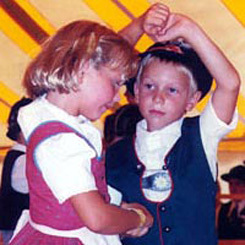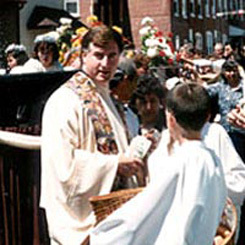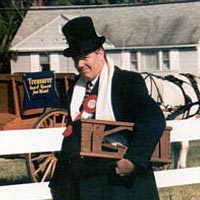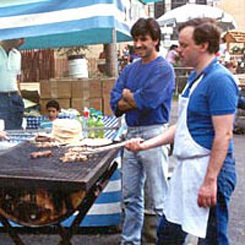
- Capital City:
- Dover
- Nickname:
- First State / Diamond State
- Motto:
- Liberty and Independence
- Statehood:
- Dec. 7, 1787 (1st)
- Origin of State's Name:
- Named after Lord De La Warr, an early Virginia governor.
- Largest Cities:
- Wilmington, Dover, Newark, Bethany, Milton
- Border States:
- Maryland, New Jersey, Pennsylvania
- Land Area:
- 1,955 sq. mi.; 49th largest
- State Bird:
- Blue Hen Chicken
- State Flower:
- Peach Blossom
- State Tree:
- American Holly (ilex opaca)
- State Song:
- Our Delaware
With the state motto of "Liberty and Independence," it's no surprise that Delaware was the first of the original 13 states of the Union; it's often called the "First" or "Diamond State." The state's name comes from the original governor of Virginia, Thomas West, Lord De La Warr. William Penn acquired the land that makes up Delaware to keep his Pennsylvania colony from being landlocked. Today, Delaware is one of the most industrialized states, known for its chemical research. Dover is the capital; the state flower is the peach blossom.
Delaware Saengerbund Oktoberfest

The Delaware Saengerbund, a German-American singing society founded in March 1853, became an important social club for newly arriving German immigrants. It has become the focal point of the German community in Delaware through its annual event Oktoberfest. Although the first Volksfest was held in Wilmington's Schuetzen Park 1883, the modern Munich-style Oktoberfest first began in 1979. The roots of this fall festival are in Bavaria, when it was first celebrated as a wedding festivity for the crown prince of Bavaria on October 12, 1810. Because of weather considerations, the Delaware Saengerbund Oktoberfest is always held on the third week of September. Nearly 20,000 people attend the three-day festival which features Bavarian bands and folk dancing. Dancers in colorful costumes perform the Schuhplattler, or "shoe slapping" dance, along with other German folk dances, such as the Ländler. Also featured during the event are German foods, including the famous German potato salad of the Ladies of the Delaware Saengerbund.
St. Anthony of Padua Feast Day Procession

The St. Anthony of Padua Feast Day Procession, which celebrated its 75th anniversary in 2000, is the most important factor in bringing the Italian-American people of Wilmington together. This annual religious procession is a reminder of their Italian heritage and faith.
What began in 1925 as a small religious procession for the new Catholic church, St. Anthony, honoring one saint, now includes twelve saints. Il carnevale was a tradition found in small Italian cities and towns to commemorate the local saint with a religious procession followed by a festive carnevale. Although a small carnevale was held for several years in Wilmington, the first large-scale carnevale took place in August 1933. In following years, the parish held its religious processions three times a year: in June for the feast of St. Anthony of Padua; in July for the feast of Our Lady of Mt. Carmel, and in August for the feast of St. Francis de Paola.
By 1975, the carnevale had expanded to an eight-day event, centered around the June 13th date, which is St. Anthony of Padua's feast day, and became known as La Festa Patronale. The festival culminated with the traditional procession of those saints that were especially important to parishioners. These saints, which are St. Anthony of Padua, St. Michael the Archangel, St. Rocco, St. Francis de Paola, St. Patrick, St. Frances Xavier Cabrini, St. Rita, St. Gabriel of Our Lady of Sorrows, Mater Maria dell Misericordia, Our Lady of Mt. Carmel, St. Lucy, and St. Pius X, are placed on platforms and carried or pulled by men for two miles through the Italian community. The procession also includes parish priests, the Bishop of Wilmington, members of various religious societies, men and women dressed in regional Italian costumes, children dressed in the Lenten religious costume, the Via Crucis (stations of the cross), a float bearing the model of the church, elected government officials, and several bands, especially the Old Colonial Band. The latter band has been performing since it was founded by Salvatore Zoli in 1900, and was conducted by his grandson, Joseph, in year 2000.
Return Day

A Sussex County historic pageant in the town of Georgetown that features a parade, including election winners and losers, constituents, high school bands, firefighters, Little League champs, craft displays, musical and theatrical entertainment, and a performance by Nanticoke Indians. Continuing a long-standing tradition, an ox is roasted in the town circle, and free sandwiches are provided to all. The former political rivals bury a ceremonial hatchet in sand (brought from Lewes, the original county seat), following a custom colonial settlers borrowed from local Indians, to signify the end of competition and the continuance of bipartisan government. The event takes place on the Thursday immediately following Election Day and dates back to 1791 when voters gathered in the county seat to learn election results.
Holy Trinity Greek Festival

The seeds for the Greek festival in Wilmington were sown in 1966, when the Piloptochos Society, a Greek women's philanthropic organization, held its first Christmas bazaar. It was like any other Christmas bazaar with crafts, white elephants, and gifts, except for one difference: Its sampling of Greek pastries proved to be the bazaar's highlight. The following year, the Christmas bazaar introduced more pastries and, for the first time, some Greek food specialties. Within a few years, the Christmas bazaar was overwhelmed by the public's desire for Greek food.
In the early 1970s, the bazaar was moved to a spring weekend and involved the entire Greek community, since the bazaar had grown too large for one organization to operate. In the mid-1970s, bazaar planners decided to emulate St. Anthony's Italian festival, and broadened the bazaar into a multi-day festival, with Greek food, exhibits, carnival games, and live Greek and American music for dancing. To kick off the 1979 festival, TV personality George Savalas was invited to the festival and to sing with the band.
By the early 1980s, the Greek festival had become a week-long event with food and music every night. The seven days of operation and five months of preparation were taking its toll on the community, and attendance was starting to decline. During the mid-1980s modifications were made that reduced festival days to four, and extended hours to include lunchtime, which attract city workers. Entertainment and activities that were not Greek were eliminated, so that an authentic Greek village festival ambiance was re-created. Dance exhibitions by the local Terpsechorean Dancers, with regional costumes from all Greek regions, have become a popular feature. Greek food, traditions and hospitality remain the hallmarks of the Holy Trinity Greek Festival.
 Print
Print Email
Email







